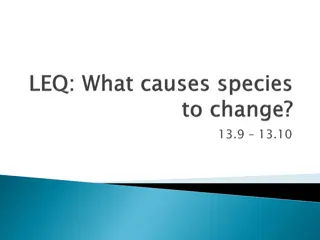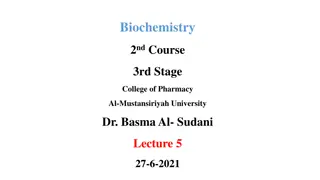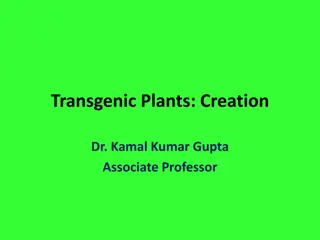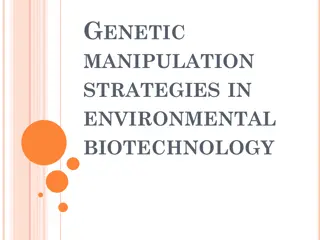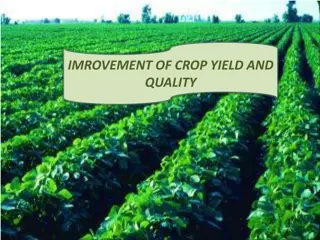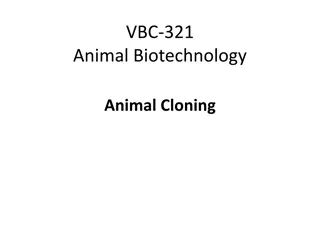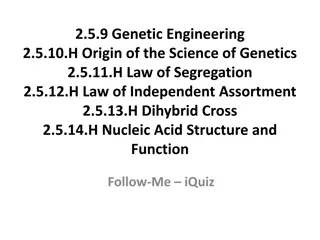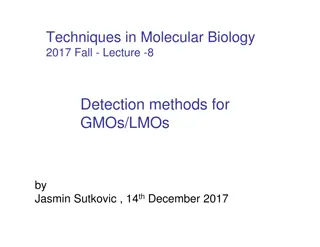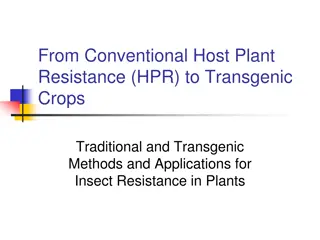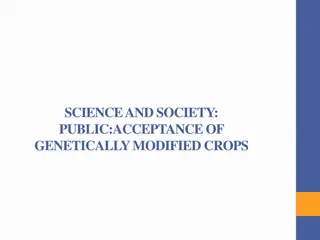Transgenic Animal Production
Transgenic animal production involves deliberate genetic modifications for improved traits. Methods like electroporation, lipofection, microinjection, and embryonic stem cell transfer are used. Benefits and drawbacks are discussed in detail.
2 views • 16 slides
Understanding Evolutionary Mechanisms: Natural Selection, Genetic Drift, and Gene Flow
Exploring the forces behind evolutionary change, this content delves into natural selection, genetic drift, and gene flow. Examples such as the bottleneck effect, founder effect, and Amish population polydactylism are presented to illustrate how these mechanisms shape genetic diversity. The impact o
0 views • 14 slides
Understanding Xenobiotic Metabolism for Biomedical Applications
Metabolism of xenobiotics, foreign chemicals like drugs, food additives, and pollutants, is crucial for pharmacology, toxicology, and disease management. Knowledge allows for beneficial applications such as antioxidant research, pollutant conversion, and drug biosynthesis using transgenic organisms.
0 views • 11 slides
Understanding Transgenic Plants and Agrobacterium Tumefaciens in Plant Biotechnology
Creation of transgenic plants involves various methods such as microprojectile DNA-coating, electroporation, and Agrobacterium transformation. Agrobacterium tumefaciens, a soil bacterium, plays a crucial role in inducing crown gall disease in plants by transferring T-DNA from the Ti plasmid. The Ti
1 views • 27 slides
Genetic Manipulation in Environmental Biotechnology
Genetic manipulation strategies in environmental biotechnology involve techniques like gene splicing and molecular cloning to modify genes directly. These methods have various applications such as isolating genes, producing specific molecules, improving biochemical production, creating organisms wit
0 views • 20 slides
Enhancing Crop Yield and Quality Through Genetic Manipulation
This chapter explores methods to improve crop productivity and quality through genetic enhancements such as increasing yield and improving plant material quality. It discusses factors influencing crop productivity, such as solar radiation and photosynthetic efficiency, and factors determining crop q
0 views • 19 slides
Advances in Biotechnology: Transforming Health, Environment, and Science
The 21st century is witnessing remarkable progress in biotechnology, with significant discoveries shaping the fields of health, environment, and science. From the introduction of penicillin antibiotics to the creation of transgenic organisms, biotechnology continues to pave the way for innovative so
0 views • 17 slides
Applications of Transgenic Animals in Biotechnology and Cloning
Cloning in animals offers the advantage of indefinite duplication of elite genotypes without the genetic risks of meiosis. Transgenic animals, genetically modified to carry foreign genes, play a crucial role in genetic research and the development of livestock with desired traits. Methods like DNA m
0 views • 13 slides
Understanding Genetic Engineering and Genetic Variation
Genetic engineering plays a crucial role in manipulating genes to produce desired traits in organisms. Concepts like the origin of genetics, laws of segregation and independent assortment, and nucleic acid structure are fundamental in this field. Understanding the difference between the nuclei of eg
0 views • 50 slides
Detection Methods for GMOs and LMOs in Molecular Biology
Techniques in Molecular Biology lecture discusses GMOs and LMOs, transgenic plants, examples like Bt cotton and Golden rice, detection methods, purpose of detection, and how transgenic plants are created. The content emphasizes the need to differentiate GM crops from non-GM crops and the importance
2 views • 40 slides
Evolution of Plant Resistance to Insects: From Traditional Methods to Transgenic Crops
The transition from Conventional Host Plant Resistance (HPR) to Transgenic Crops for insect resistance in plants has a rich history dating back to the 1790s. Traditional methods like breeding for Hessian fly resistance in wheat have paved the way for modern techniques. Factors influencing insect res
0 views • 36 slides
Public Acceptance of Genetically Modified Crops: Concerns, Status, and Trust Issues
The discussion explores the concerns surrounding genetically modified crops, touching on public acceptance, regulatory measures, and the current state of GM crops in world agriculture. Surveys conducted in the USA and UK reveal varying levels of public support, with issues of trust, safety, and ethi
0 views • 32 slides

